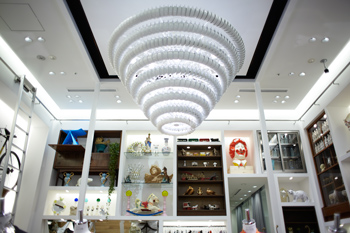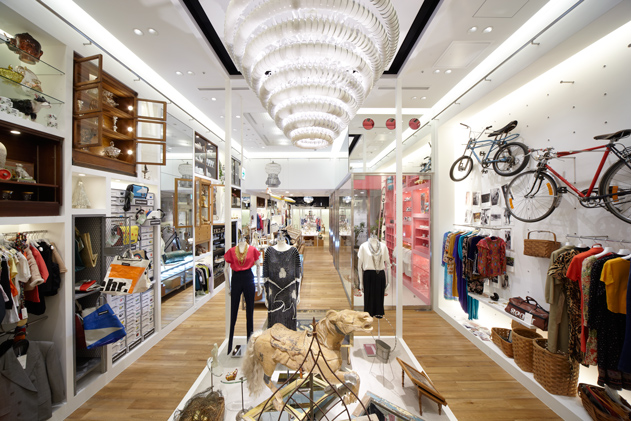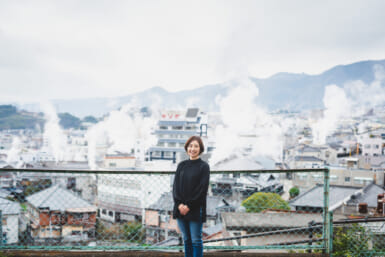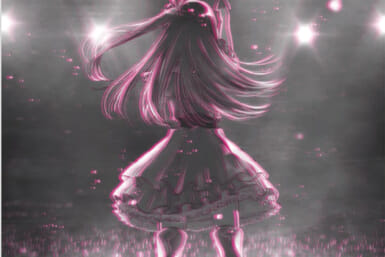The recent slow economy has prompted consumers in Japan to become even savvier shoppers than before, with people always on the lookout for something truly unique and special. Add to this the newfound fascination with recycling and all things ‘green,’ and you have the perfect environment for a new store called Pass the Baton to shine. The brainchild of Masamichi Toyama, the first Pass the Baton store opened in a small space in Marunouchi’s Brick Square building last fall. Late April saw the opening of a new, much larger location in Omotesando Hills, proving that Toyama is on to something. He sat down with Weekender’s Kelly Wetherille to talk about his ideas and plans.
What is the concept of Pass the Baton and how did you come up with the idea?
Simply put, it is a modern select recycle shop. There is plenty of value in things that already exist, so I thought it would be good to be able to circulate those things. And frankly, there’s never really been a recycle shop that I wanted to go to until now. So I wanted to make a recycle shop where people could share in the value of things.
When I started thinking it would be interesting to open a recycle shop, I visited many existing shops. At one point I went in with two big paper shopping bags both completely filled, and I only received ¥850 for them. I was heartbroken, because inside were some shirts that I had really loved, but there was no value or appreciation put on these things. If there was a small spot or something they returned it to me, but as long as it was clean and looked new it was fine. There was no sense of style or design. And since the shop buys the things, they want to give the cheapest price possible, whereas the person selling it is happier with a higher price, so there’s a real disconnect. To avoid this, we have a different system at Pass the Baton. The person selling their things decides the prices and then leaves them in the shop. When they sell, the sale price is split half/half between the shop and the seller. There’s no haggling.
 The other thing that is unique about Pass the Baton is that we take a photo and get a profile of each seller, along with the story behind each item. This makes it really interesting to see how each item relates to the seller’s own specific culture. Everyone has his own history, culture and sense, so we want to gather things that have that kind of value, not just designer clothing. [Pass the Baton’s tagline is, “Pass the personal culture. Pass the baton.”]
The other thing that is unique about Pass the Baton is that we take a photo and get a profile of each seller, along with the story behind each item. This makes it really interesting to see how each item relates to the seller’s own specific culture. Everyone has his own history, culture and sense, so we want to gather things that have that kind of value, not just designer clothing. [Pass the Baton’s tagline is, “Pass the personal culture. Pass the baton.”]
How do you choose which items to include in the store’s selection?
We do have to be somewhat selective, so sometimes we have to tell people that we can’t accept some things because they don’t match the concept and atmosphere of the shop. But I think it’s good if we can accept just about everything that’s brought to us, so we appreciate people looking at the shop first and then bringing things that they specifically think will fit with the rest of the shop’s selection. Also, we are really looking for things that people may not use, but would be a waste to throw away…things that they really love, but maybe the size is wrong, or something like that.
You mentioned that the concept is a ‘modern’ recycle shop. Does that mean you don’t really deal in antiques?
I’ve always liked antiques, and there are definitely people who come to us with antiques. And in addition to getting things from individuals, we stock antiques that we buy from abroad. But generally [for clothing] we get things that are more recent, maybe from about the 80s. And right now there’s a small 80s boom happening, so these things are very popular.
It looks like in addition to used items, you also sell some new products. Is that true?
Well, I’m not sure I would call them new, but in addition to getting things from individuals, we have also started working with other businesses. For example, we have Dean and Deluca tote bags that are slightly flawed in some way. Most people wouldn’t even be able to tell, so to throw them away seems like a real waste. We take these bags, put some kind of new design on them, and then sell them as new, unique products. Also popular are our rusk and teacup sets. The teacups are from a Japanese china factory that made products for exporting to Europe, but they have a lot of slightly imperfect items left over that were never exported. In fact, there are so many that you can literally climb up the crates in the warehouse searching for what you want. We choose cups that fit into our selection, and then sell them as a set with rusks made by a bakery in Hanzomon. We sell about 700 of these every month between our two stores.
 Things seem to be going well for you so far. What are your hopes or plans for the future?
Things seem to be going well for you so far. What are your hopes or plans for the future?
I am really interested in the concept of exchanging personal culture between different people, so it makes me happy when people from overseas bring their things to our shops. I’d be very excited to see more foreigners who live in Japan bring in things from their homeland to sell in our stores. I also really want to open Pass the Baton shops internationally…like in Paris, London, New York. That way we could move things around the world…things that are collected in London could be sold here, and things collected in Japan could be sold overseas. I think it would be really interesting to see items circulating like that.
The Marunouchi branch of Pass the Baton sells only curios and interior items, but the Omotesando store also includes clothing, a gallery,and even a section of items from the personal collection of Nigo, the founder of A Bathing Ape (BAPE). The Omotesando branch also includes a ‘pass counter,’ where visitors can leave items to be sold.
Pass the Baton Omotesando
B2F Omotesando Hills West, 4-12-10 Jingumae, Shibuya-ku
Open Mon–Sat 11am–9pm, Sun and holidays 11am–8pm
Tel: 03-6447-0707
Pass the Baton Marunouchi
Marunouchi Brick Square, 2-6-1 Marunouchi, Chiyoda-ku
Open Mon–Sat 11am–9pm, Sun and holidays 11am–8pm
Tel: 03-6269-9555








